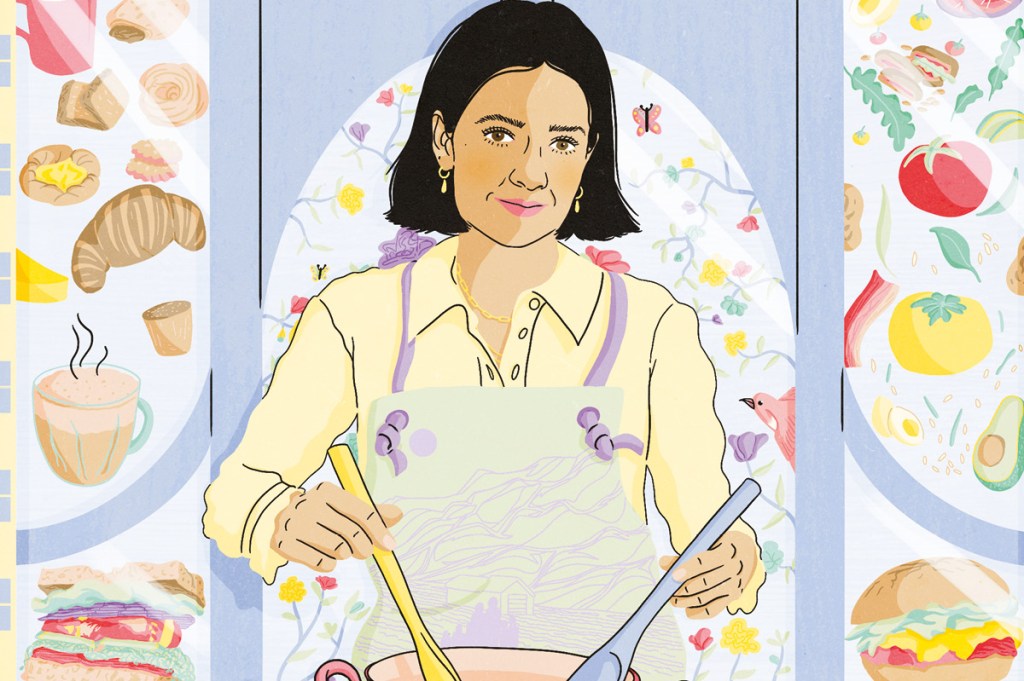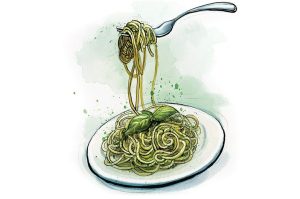At the age of sixteen, chef and restaurateur Forough Vakili, now forty, left Iran to meet a brother she barely knew, eventually settling in America. She didn’t return for eleven years.
As a member of the minority Baháʼí faith, which teaches the value of all people, regardless of gender or religion, Vakili had hit a wall in her homeland. “I came here so I could continue my education,” she says, when we speak over Zoom. “We didn’t have many rights back in Iran — there wasn’t a lot offered for us after finishing high school.”
It was in Vienna, waiting for her American visa, that Vakili reconnected with her brother for the first time since she was a toddler. Six months later she moved in with him, his wife and three daughters in Atlanta. “We clicked initially,” she remembers. “But it was a bit of a challenge; we had some difficulty. It was a huge responsibility put upon him.”
When she arrived in the States, Vakili spoke almost no English. Yet her story is, in many ways, an embodiment of the American dream. After graduating from the Georgia Institute of Technology with a major in chemical engineering, Vakili worked in the field for just a few years before quitting to follow her passion: food. She studied at the Cordon Bleu in Paris and in 2021, after countless pandemic delays, finally opened her own restaurant, Le Bon Nosh, in her adopted Atlanta.
“I created Le Bon Nosh based on all the things I had experienced and loved,” she says. The marble and brass coffee bar resembles the old Italian caffès; a lunchtime display of gleaming bowls of grains and veggies was inspired by California food culture. The menu evokes a French bistro (beef tartare, steak au poivre), but with a sprinkling of Iranian ingredients. As Vakili puts it, “I designed the menu here very much the way I would cook at home.”
I first met Vakili last fall, when we shared our love of food over pancakes and green juice in Manhattan’s Balthazar. In person, she presents as an epitome of French chic, with a played-down, thrown-together look and manner. Months later, when we connect online, Vakili speaks from a desk in her office with her dark hair pulled back, wearing delicate small earrings, layered necklaces and a soft black V-neck sweater.
Her understated demeanor betrays a steely confidence. Today, Vakili manages forty members of staff and has big plans for expansion, despite juggling her duties as the mother of a nine-year-old and a two-year-old with her husband, who owns a tech start-up.
“My ambition is to build a food brand that stands for doing better in society, be it from the quality of the ingredients we source or a higher wage that we pay our team,” she enthuses.
Le Bon Nosh already delivers healthy meals (mac and cheese with grated cauliflower; wholewheat pasta) to kids in underprivileged neighborhoods. The next step, launching this year, will be to provide a line of products to local consumers directly sourced from farmers.
Finding the best of everything is a cornerstone for Le Bon Nosh. Vakili’s father worked in the Persian rug industry and her mother was a homemaker. She grew up as the youngest of five siblings and spent her childhood dividing her time between their home in Birjand, capital of South Khorasan province, and a family farm. While the region is famous for its saffron, her favorite memory is the mozzarella her mother made from their cows’ milk, a household staple.
Now Vakili uses a near-identical sheep cheese called tuma, made by nearby Decimal Place Farm, in her restaurant. “The texture is similar to a mozzarella, in that it’s a little bit more moist, but it’s done flat and big, rectangular in shape, an inch thick. It has the most delicate flavor,” she says. “I grew up eating that for breakfast with a slice of walnut and fresh herbs and a piece of homemade bread, which is similar to a lavash, very thin and crackly.”
When Vakili moved to America, she was shocked, delighted even, at the sheer abundance of food. “At the time I found it the most fascinating thing being able to go to these amazing grocery stores and being able to buy whatever you wanted whenever you wanted — it was just mind-blowing to me,” she says. At first, she loved it. But when she moved to Paris, she rediscovered a culture more connected to the rhythm of its food. “I vividly remember saying to myself: I want to bring a piece of this thing that I have experienced here in Paris, and living in Iran, that [sense of] community around food, to the US.”
Over the years, Vakili has travelled back to Iran to visit the farm, friends and family. But, given the recent protests against the authoritarian Supreme Leader, which have led to brutal government crackdowns, she feels suddenly cut off.
“We’ve always been persecuted but now it’s very much extreme. The risks are too high right now for me to travel back,” she says somberly. “I feel good that we have such a fearless generation right now back home that is asking what is right for them. But I also feel sad that we have to lose so many people to have just the simplest rights… The young generation are basically saying we have nothing to lose.”
This time, she predicts, the uprisings will be different. “It’s not one of those things that is a quick one or two months of riots and then they’ll let up. People are fed up. Yes, maybe we won’t have a change of regime and maybe that is something that will come later, but at least some of the human rights, especially for women — hopefully — will be granted.”
As for Vakili, twenty-three years after arriving in the US, with two kids and her own business, she finally feels more settled. “So many people who are transplants always point to the fact that… we don’t quite feel like Americans,” she says. “As my roots have become stronger here, and I started having a family of my own, I more and more feel that this is home.”
This article was originally published in The Spectator’s May 2023 World edition.





















